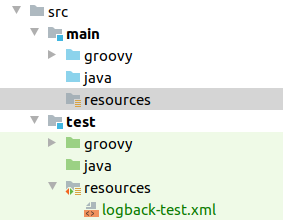I sometimes create libraries with less overhead than the e.g. a grails plugin.
Applying the same logging as grails is done with these steps:
- add dependencies
- add configuration files for testing
build.gradle:
dependencies {
compile 'ch.qos.logback:logback-core:1.2.3'
compile 'ch.qos.logback:logback-classic:1.2.3'
compile 'org.grails:grails-logging:4.0.1'
}Then create the src/test/resources directory:

In this case I configured test logging with logback-test.xml. For some reason I could not make logback-test.groovy work.
<configuration>
<appender name="STDOUT" class="ch.qos.logback.core.ConsoleAppender">
<!-- encoders are assigned the type
ch.qos.logback.classic.encoder.PatternLayoutEncoder by default -->
<encoder>
<pattern>%d{yyyy-MM-dd HH:mm:ss.SSS} %-5level [%15.15thread] %-50.50(%logger{35}.%M) %4.4line - %msg%n</pattern>
</encoder>
</appender>
<logger name="no.prpr" level="TRACE" additivity="false">
<appender-ref ref="STDOUT" />
</logger>
<logger name="org.hibernate.orm.deprecation" level="ERROR" additivity="false" />
<root level="INFO">
<appender-ref ref="STDOUT" />
</root>
</configuration>The test could look like:
@Slf4j
class UserToTenantSpec extends Specification {
void 'Test valid username'() {
when:
String tenant = UserToTenant.getTenant('abc00')
then:
tenant == 'abc'
}
}